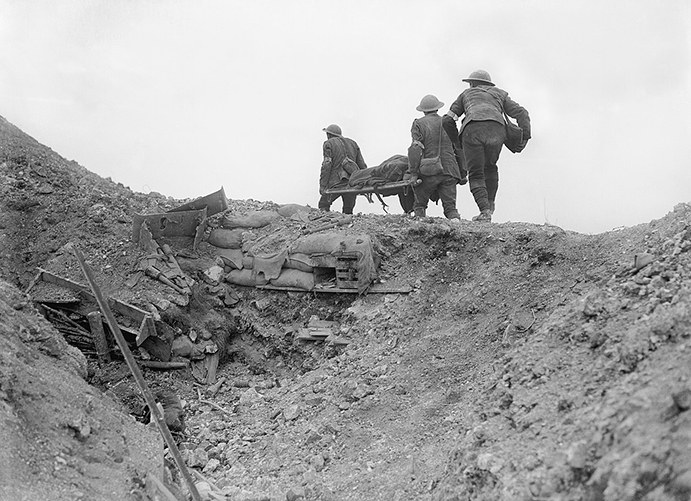
Wounded soldiers being transported out of the Battle for Thiepval Ridge
"What have I to dread, what have I to fear, Leaning on the everlasting arms; I have blessed peace with my Lord so near, Leaning on the everlasting arms." (from Leaning on Everlasting Arms by Anthony Showalter (1887))
On 26th September after some weeks of preparation, the 8th Battalion and the 10th Essex Regiment were on the front line, leading the next offensive which was focussed on Thiepval Ridge and the Schwaben Redoubt. Lieutenant-General Claud Jacob, who planned the attack, believed that offensives should consist of one line of troops at a time - arguing that multiple lines of attack got caught in German counterattacks. He also believed that afternoon attacks were more likely to succeed than dawn attacks. Accordingly the offensive started with a succession of single waves of troops at 12.35pm.
From the 8th Battalion A Company, lead by Captain Angier (Edwin's Company), and D Company, lead by Captain Usher, were leading. B and C were in support.
We know from Edwin that Clee2 (another 2nd Lieutenant in A Company, and a friend of Edwins) tossed a coin with Edwin to decide who took the first of the three waves of attack. Edwin lost and so he lead his platoon over the parapet first.
The objectives were Schwaben Trench, Zollern Trench and finally Midward Trench (including part of Schwaben Redoubt).
Sydney Fuller, a private soldier who kept a covert and illegal diary throughout the war, was in D Company and he records participating in a fourth wave. He provides more information, and is more candid that Edwin who is of course writing to his mother.
The Battalion reached the assembly trench at 10am - a warm late-summer day, where they waited until 12.35pm for the battle to begin. They did not fix bayonets (in case "the enemy saw them glitter in the sun") and no rum was issued. The artillery started about 30 seconds before the first wave went over, followed a few seconds later by the second, then third, and finally the fourth wave.
Edwin notes that he and Clee dressed as privates - presumably to avoid becoming a particular target for enemy fire.
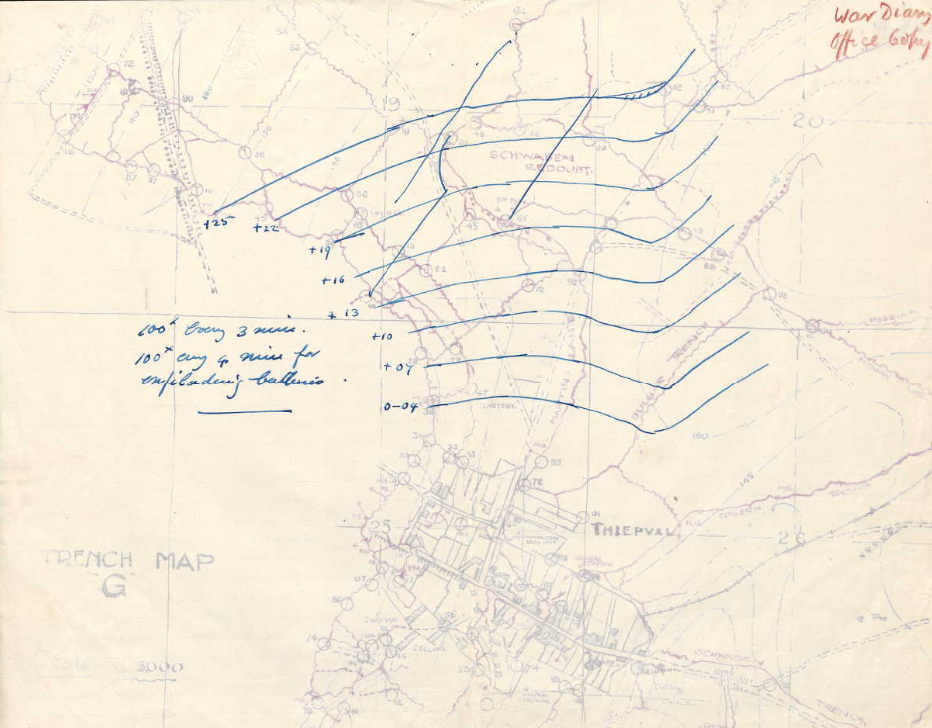
Fuller notes that each wave walked at a steady pace, with the first wave creeping forward just behind the shell barrage which protected them. Each soldier carried their rifles at "high port", bayonet pointing upwards and to the left to avoid spiking each other. With the enemy bombardment landing behind them, killing some with shrapnel, the men had the perception that there were not many bullets being fired at them. Fuller wonders whether this is just because they can't hear them over the noise of the bombardment. Soldiers were stopping to light cigarettes.
At 12.41 wave 1 were reported to have gone over the parapet. By 12.47pm wave 1 was in Schwabern Trench achieving the first objective where the enemy was taking cover in dug-outs.
Both Fuller and Edwin are clearly shocked by the effect of the British bombardment on the Germans sheltering there. Fuller describes one German buried to the neck "ghastly white, his eyes staring with terror, unable to move, while our chaps threw bombs past him down the dug-out stairs, and the enemy inside threw their [Fuller's emphasis] bombs out.".
Edwin records "The Germans came shrieking out of their dugouts in a horrible condition, our artillery barrage fire was devastating.".
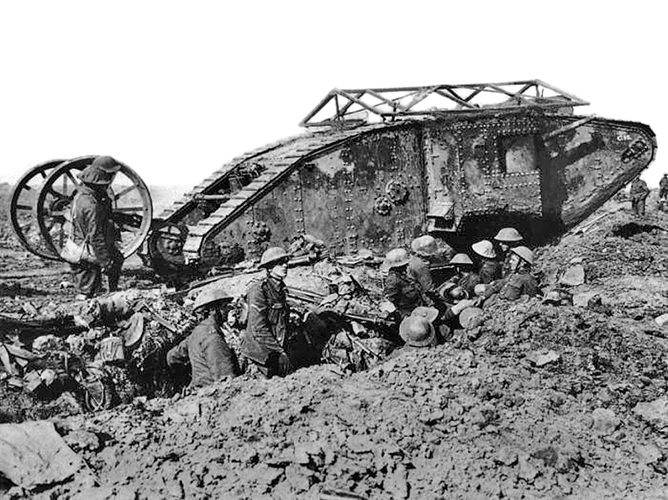
A tank deployed at The Battle for Thiepval Ridge
By 1.21 pm wave 1 was in Zollern Trench, but they were ordered to wait outside the trench in shell-holes nearby because the British were worried that the enemy trenches may have been mined. A British tank3 (the first Fuller had seen in action) started to shell the trench believing the soldiers had been driven back due to a counterattack. Field Marshall Haig suggests that the tank was decisive in winning the offensive, but Fuller suggests that it gets stuck in a shell hole, while he is pinned down by heavy rifle and machine gun fire as the company advance on the final objective.
On schedule this advance started at 2.15pm. Fuller observes that "several men were killed and wounded in front of and all around us." Edwin says "Men were shot down beside me, but on I went closely followed by my servant, German snipers gave us a rough time when we got towards our final objective. Men were shot if they even knelt up from the ground, but Clee and I lived charmed lives."
Fuller adds "Every time we tried to go on, the machine gun and rifle fire started again, so it was no use doing anything but "dig in".
At 5pm it was reported that parts of A Company were being held up by machine gun fire from Midway and Bulgar Trenches.
The War diary notes a message from Captain Angier at 5.10pm "I am withdrawing two platoons from new front [indicating that Zollern Trench is now secure], leaving out the other two as a covering wave ready to move forward if possible. Meanwhile we are clearing up Zollern Trench ready for splinter shelters. Will you send up materials for this work, wire and stakes."
Fuller and D Company returned to Zollern Trench around 9pm. He notes a nearby dugout "had already been selected as Company Headquarters for A (Angier) and D (Usher) company.". D Company had lost two of their officers: 2nd Lieutenant Mason (killed), and 2nd Lieutenant Ballantyne (wounded). 2nd Lieutenance Hannaford was wounded coming up to the trench overnight - later losing his leg.
Edwin notes that A Company lost more men but fewer officers.
Fuller is withdrawn the following morning, and Edwin's company also swaps roles, holding Zollern in support leaving B and C companies to lead the offensive.
At 1pm on 28th the attack was renewed. Bulgar Trench was taken almost immediately but it was not until 2.30pm that the final objective, part of the Schwaben Redoubt was achieved.
The War Diaries records 4 officers died and 4 were wounded (one subsequently died of his wounds). 161 other ranks were wounded, 25 died and 15 were missing.
Lieut. Col. C.C.R. Murphy remarked, in his book The History of the Suffolk Regiment, 1914-1927 that the 8th Battalion may well be proud of their share in the desperate battle of Thiepval, perhaps their greatest achievement.
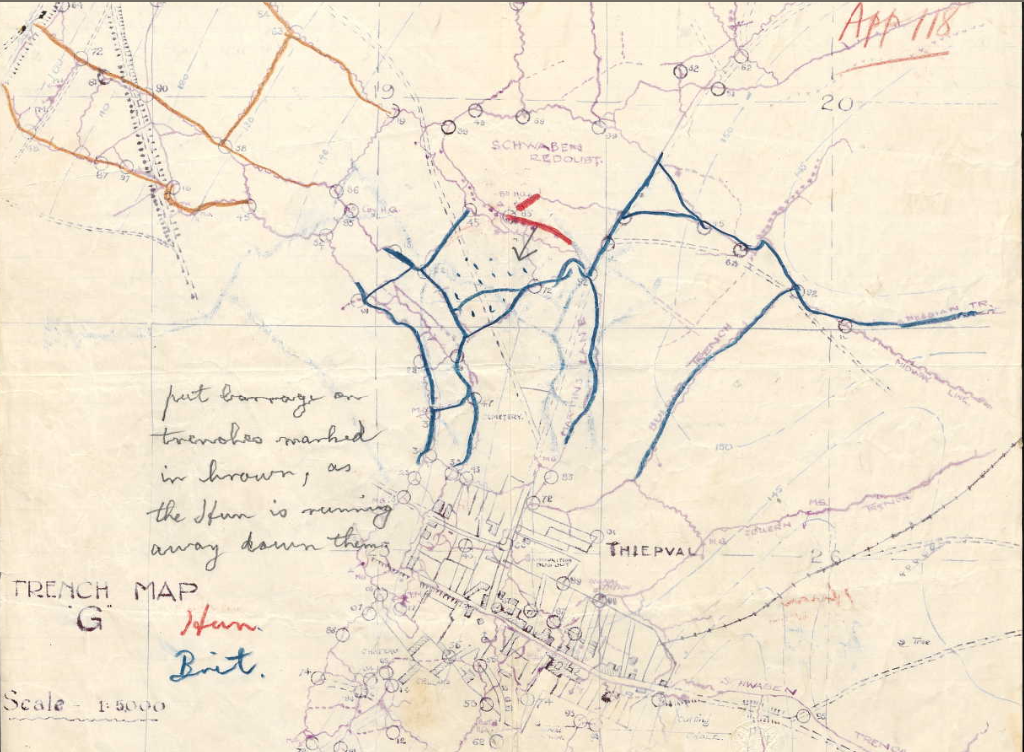
"Put barrage on trenches marked in brown, as the Hun is running away down them."
Edwin's letter dated 30th September 1916
Edwin's letter was written one day after the Battalion was relieved on the 29th, and taken by bus back to Forceville. Unsurprisingly his letter is less ordered than normal. This was his first real involvement in an offensive - his first real taste of war.
He observes "somehow I cannot write. [I] am not quite settled down again yet."
While he reassures his mother "At any time during the battle I did not really feel like being killed.", he ends his letter "I am glad I am through.".
He does not seem too unsettled to recognise the arrival of his mother's cake as bizarre. It is brought up to Zollern Trench (which had been in German hands twenty four hours before), he notes while they are still fighting.
The sentence "I dont envy the wounded even though they are back in England by now. Theirs was a rough journey from the battlefield." reflects a thought held by many soldiers had. Getting wounded. but only sufficiently seriously to get home, is a good outcome. Fuller notes "A man just in front of us was hit by one of the splinters, which entered his right side. and stopped just under the skin in the centre of his chest...like a large boil. We... bandaged him up as best we could. In the same shell-hole was another man who had been shot through the calf of his leg - a nice 'Cushy' one".
Edwin refers to having a charmed life, with Everlasting Arms beneath him. The reference is from Deuteronomy - an idea that some believers when oppressed, will not be overwhelmed. Everlasting arms are beneath them keeping the spirit from sinking, and faith from failing. The everlasting covenant, and everlasting consolation that flow from it, are everlasting arms.
Edwin is not the first to extend this idea of inner strength through faith, to actual strength. The idea that God is guiding shells and bullets is easier to tolerate than chance.
The Battalion remains out of the line until until October 14th (two weeks later). They are moved to Albert where they are congratulated for their victory. They are then prepared for an attack on Regina Trench, which has been scheduled for 16th. This attack is delayed due to persistent rain and the Battalion are relieved before the attack takes place.
8th Suffolks, BEF, France.
My dear mother
I expect you have been a little anxious about me lately as you have not heard from me for several days.
Well a week ago we suddenly had orders to move up and take part in the last big push, you know where I have been if you noticed the progress made as announced by the papers.
Of course I knew all about it weeks before but not where we were going. The papers describe it as the greatest victory the Allies have scored. Of course I cannot go into details here, but it was really awful. Our company was in the front line forming three waves. Clee and I tossed up for who should take the first wave, and I lost, so went over the parapet in the first wave of men. We lost fairly heavily but I came through unscathed. So did Clee and our Company Commander. The other companies lost more heavily in officers but less in men.
We were in it for four days and it is indescribable.
The Germans came shrieking out of their dugouts in a horrible condition, our artillery barrage fire was devastating. Men were shot down beside me, but on I went closely followed by my servant, German snipers gave us a rough time when we got towards our final objective. Men were shot if they even knelt up from the ground, but Clee and I lived charmed lives. You know why I was kept, and I know it too, beneath me were the Everlasting Arms1 undoubtedly.
I was sitting on a box the next day and a 5.9 burst 5 yards from me and covered me with earth. We held the final trench for two days and were strafed unmercifully.
Both Clee and I have been congratulated on the good work we did.
Your cake came up the front trench to me, an orderly brought it up under fire. The other parcel I've just had on arriving back to the billets together with a cake from Hereford in Ivy's name. [I] am very pleased with what you have sent. I meant the EADTimes [East Anglian Daily Times] to be sent occasionally.
Glad to hear Dad has had all his teeth out and that they are healing quickly.
Thanks for the photo I think it is better than the other one. I will write to Muriel Cowley. Ive lost my comb and would like another please.
At any time during the battle I did not really feel like being killed.
I am sorry you wont take a present from me, you know you are always welcome. So are the others. I appreciate your thought of saving my money very much, and there is no need to spend your own.
Glad to hear the Zepps did not come near Ipswich or you.
Thanks for the news in your letter, I am always glad to hear little items.
Am feeling extremely fit and happy just now, so are the others, but somehow I cannot write. [I] am not quite settled down again yet.
Clee and I went over in complete privates rigout with rifle and bayonet and revolver.
Thank little Joan for her kisses, I send some back. She really writes very nicely.
I don't envy the wounded even though they are back in England by now. Theirs was a rough journey from the battlefield.
Have just got Jack's letter. I will answer tomorrow.
Love to everybody.
I am glad I am through.
Eddie.
Letter and Christmas Gift to Battalion Commander, Lieutenant-Colonel G.V.W. Hill. from Major-General Ivor Maxse
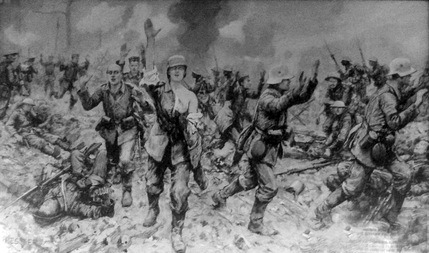
My Dear Hill, Please accept this little sketch representing an incident during your Battalions fine attack on Thiepval, on which occasion the 8th Suffolk Regt so greatly distinguished themselves. Yours sincerely, F. I. Maxse
History of the 8th Battalion, Suffolk Regiment (1918)
The attack on Thiepval in conjunction with 10th Essex, was a complete and immediate success. Close behind one of the finest barrages it was possible to imagine, advanced the attacking troops, who speedily overran the village, killing or capturing the entire garrison, and gained their objectives punctually, and with but small loss. The redoubtable fortress had fallen and the Battalion was everywhere on the summits, which for so long had looked down on the British lines.
Bury Free Press - Saturday 21 October 1916
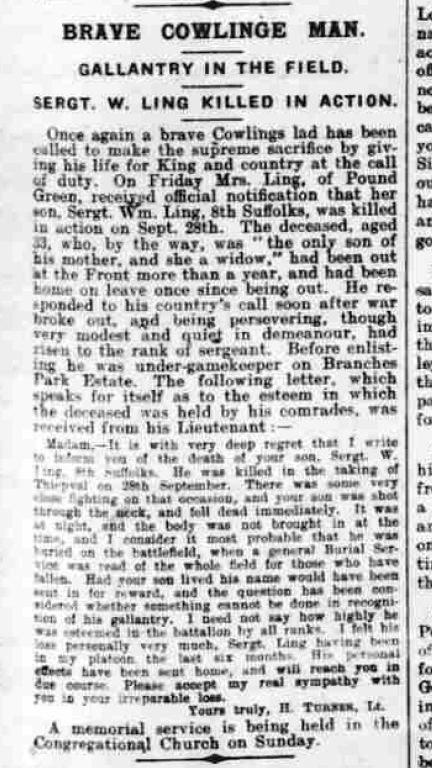
References
1 "Leaning on everlasting arms" by Anthony Showalter (1887)
Inspired by Deuteronomy 33: 27. It is possible that Edwin is referring to Deuteronomy not the hymn - which refers to "underneath [or beneath] are the everlasting arms".
2 Charles Beaupre Bell CLEE: Born on 5 February 1893 and was educated at Fitzwilliam Hall, Cambridge. During the Great War he served as a 2nd Lieutenant, Lieutenant, then Captain in the 8th Battalion Suffolk Regiment and was mentioned in despatches (London Gazette 9 April 1917) ‘for gallant and distinguished services in the field.’ In 1919 he entered the Indian Civil Service and in 1924 was Assistant Collector and Magistrate in Bombay. In 1931 he married Rosemary Margaret Meredydd Rae. In 1932 Clee was appointed Officiating Secretary to the Government Home & Ecclesiastical Department in Bombay and in 1935 became a Collector and Magistrate. Appointed to the post of Secretary to the Government Finance Department in Sind in 1936, he was rewarded with C.I.E. two years later. Further appointments to the Government of Sind followed, appointed Chief Secretary in 1940 and Revenue Commissioner in 1943. He was created a Companion of the Order of the Star of India in 1946 and a Knight Bachelor in 1947. He retired in 1950 and died on 28 May 1980.
3 The tank. See also The tank, …….. a piece of porcelain …. and the auction house by Andrew Simpson.